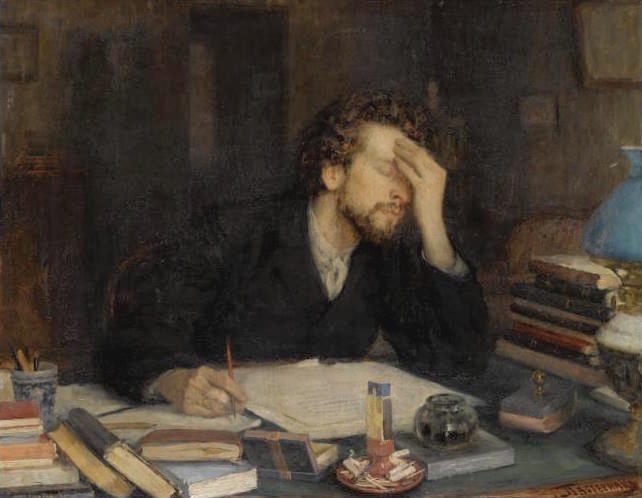By Christopher Lehman, Founding Director @TheEdCollab
To celebrate NCTE’s National Day on Writing we are sharing posts from The Educator Collaborative family today. Follow the official hashtag: #WhyIWrite
You are not really a writer unless you are filled with absolute dread almost all of the time.
Not for the act of typing keys or writing with a pen, those things you learned when you were young and mostly run on autopilot now—unless you try to type on a phone with tiny baby buttons for your adult-human sized fingers.
The dread is feeling fraudulent. I feel that way often. Feeling like: who are you to say anything about anything to anyone? The dread is that the words you do write will not be as good as someone else’s or, worse, will not be as good as you meant them to be.
When I write with adults a time always comes for us to share and that sharing almost always begins with a fountain of words from at least 90 percent of the sharers to the sharees: “I don’t really like this part, but,” “I didn’t have much time, so,” “This didn’t go the way I wanted and it needs work” and the full-on defeated: “I’ll share but this isn’t very good.”
Most of us either never start writing or stop so often because we worry that the words we wrote will be judged.

I am here to say: they will be judged.
Yes, sorry about that.
Your. words. will. be. judged.
If you have ever gone to an open mic poetry reading, had friends who performed in the Fringe Festival or made a really horrible mistake in your Netflix choice, you know what bad writing sounds like and you love to hate it.
Nothing is more fun to me, actually, than talking about terrible writing. Acting like I was at the table read for a horrible television script when a heated debate breaks out around what the main character should shout to his love as the train pulls from the station. I imagine that the writing team, with my input, picks the most cloyingly obnoxious option, like: “my heart is but a letter in a bottle floating at sea for you, Eunice.” We earnestly high-five each other thinking we are geniuses and the Emmys are on their way. Terrible writing is painfully fun sometimes.
Our fear of being a writing fraud is justified because we know how we judge others’ writing. We draw the, correct, conclusion that others will judge us, too.
I am also here to say: that this is not an acceptable reason to avoid writing or believe you are not a writer.
Judgement is a given, it is constant in the universe, it is the way of the world. You will be critiqued, at some point negatively, by someone. You can never, ever, never-ever not be.
No matter how many “gosh, I just didn’t have time to finish this”es you say, someone may perfectly well roll their eyes a bit and go, “eeeeeh,” after you share your writing. They may quietly think to themselves that you are not very good and who are you to say anything about anything. They may even be right! Your writing may actually be terrible that time or, at the very least, terrible to some people.
So, if you have ever been filled with the absolute dread of being a fake, a fraud, or just not very good: Welcome. You are one of us.
I have had bad book reviews, negative reactions to blogs, and some conscientiously passive-aggressive individuals have even Tweeted me an explanation of why they are unfollowing me. You may be doing that right now, too.
Not only is it not a good excuse to not write, having a little fear in your life is a good thing. It reminds you that people are listening and watching. At the Dodge Poetry Festival in Newark, NJ, Billy Collins told the audience something close to: “Let’s say you want to write a poem about the relationship with your mother. Well, I have to tell you, readers don’t care about you or your mom. They are not interested. What readers do care about is poetry. You need to wow them with poetry if they will ever care about your mom.”
Writing is made of two parts: writing to figure out what you mean and writing so an audience cares about it. The sort of good news is that the more you write and more comfortable you get in your ability as a writer the more you tend to work on both at the same time.
The fear of judgement, when embraced, can actually help your writing improve. You can write thinking ahead to what someone may criticize or be confused by and decide how to handle that now, while you draft.
This can also help you create new self-talk for when you get into a bout of writers block. You can be kind to yourself and say: “I am going to write a bunch of nonsense now, but I’ll go back and revise it thinking about person A, B, and C.” Or you can be flip with yourself: “Well, a lot of people are gonna hate this anyway, so why worry. Whoopee!” Either way, accepting this dread as normal and universal can actually be quite freeing.
Also, just to say it: if you are not ever fearful as a writer, then you likely really are not that good at it. You are probably the three-year-old with chocolate cake covered fingers that runs around the restaurant touching every table cloth and plate as your doting parents call you “cute.” You need to get some doubt in your life.
Would you like to write for the Community Blog? We’d love to have you!
Visit Write with Us to learn how!







